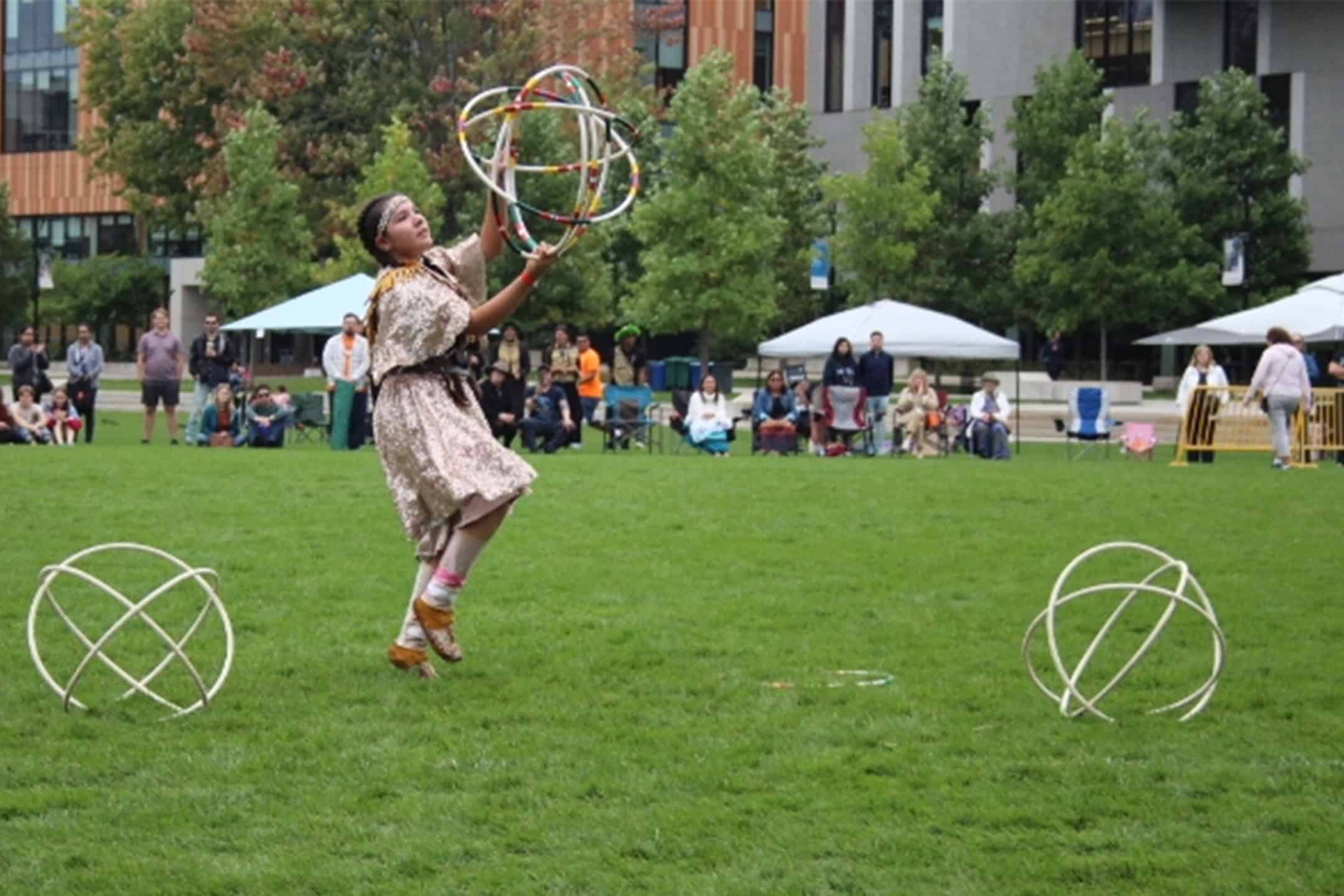UTM held its second All-Nations Powwow on September 28, just two days before the National Day for Truth and Reconciliation. Following last year’s considerable turnout, the UTM Indigenous Centre moved this year’s Powwow to the North Field.
A Powwow is an Indigenous social celebration where community members gather to enjoy traditional singing, dancing, and cultural exchange. At the All-Nations Powwow, all community members were welcomed and encouraged to attend to learn about what a Powwow offers. Attendees also had the opportunity to support local Indigenous businesses at the featured market.
The event was hosted by Steve Teekens, who served as the Master of Ceremonies and welcomed guests from several Indigenous communities, including Ojibwe, Cree, and the Oneida Nation of the Thames.
This year’s event focused on environmental sustainability and organizers made a concerted effort to minimize the gathering’s environmental impact.
MJ Singleton — a fourth-year student at UTM studying psychology and criminology law and society — was head Powwow staff volunteer from Migisi Sahgaigan (Eagle Lake) First Nation.
In an email to The Varsity, Singleton wrote, “One of the ways we were mindful of environmental sustainability was through providing guests with a portable water refill station. Water or nibi (in [A]nishinaabemowin) is important because we often say “water is life” in acknowledging our relationship with it.”
Singleton added that by having portable water refill stations, participants contribute to the efforts to “reduce the use of plastic waste in our environment and Mother Earth without single-use water bottles.”
While the Powwow focused on environmental sustainability, it also served as a space for deeper reflection on community values. Kim Wheatley, an Anishinaabe Head Elder and Water Keeper, also spoke at the Powwow, delivering a heartfelt message urging attendees to connect with the present and future by honouring their ancestors — whom she referred to as grandmothers and grandfathers.
“[The ancestors] are connected to the past, the present, and the future,” Wheatley said. “They teach us about respectful relationships and how to heal our bodies,” she added, inviting everyone to offer gratitude for creation.
Wheatley emphasized the importance of the natural world from the grasses and trees to the animals, reminding the audience to live in harmony with the Earth and not take more than they need. She expressed her gratitude in Anishinaabemowin and said, “Chi Miigwech.”
After the grand entry, Vice-President of UTM Alexandra Gillespie, warmly welcomed the Indigenous community and attendees. She expressed her gratitude for the event’s inauguration and highlighted UTM’s dedication to fostering a community that respects and upholds treaty rights.
Gillespie reflected on the day’s significance, particularly following Truth and Reconciliation Day, emphasizing the university’s role in supporting Indigenous leaders’ calls to action. “We expect even more to join us under the sky today, which is offering us a little beautiful, cleansing rain,” she said.
During the Powwow, a dance was led by head organizer Deanne Hupfield, who organized dances like a hoop dance, — performed by Emilee Pitawanakwat — Grass Dance, men’s Traditional Dance, and the women’s Jingle Dress Dance. According to Anishinaabe tradition, the women’s Jingle Dress Dance originated from the Whitefish Bay community and is known as a healing dance.
This year’s special guest was the Māori peoples of Aotearoa or New Zealand, who travelled to participate in the event. In their opening ceremony, they performed a ceremonial Haka, expressing Manaakitanga or generosity: a traditional welcome that embodies the spirit of hospitality and respect.
Nuki Takao, a Māori writer invited to the Powwow, expressed to The Varsity the significance of being part of the event.
“We’re so proud to be here. We were so humbled when we were asked to be part of the open ceremony,” she explained. “We came to honour the traditions of… the Tangata Pino, the people of the land […]. These experiences [will] stay in our minds and our hearts for generations.”
Takao also noted the importance of learning from other Indigenous peoples. “We’re learning so much about how First Nations celebrate, and… seeing all these generations — children, young people, adults, elders — all dancing together, it’s magic. I don’t know when I’ve ever seen that.”
For the first time, the All-Nations Powwow featured a special contest for the men’s Traditional Dance. The competition was a nod to Indigenous cultures’ resilience, where storytelling through dance connects generations. The dances signified stories told within their communities, the trials they faced, and how they overcame them.
Singleton also noted how powerful it was to see non-Indigenous students, especially international students, engaging with the culture for the first time.
“I’ve had friends who have never come to a Powwow before, and I’ve spoken with them and [seen] them really engage with the culture. And, especially since a lot of them are international students, it’s really cool to see that they’re learning about us and our First Peoples here on Turtle Island.”
Director of Indigenous Initiatives at the Office of Indigenous Initiatives at UTM Tee Duke expressed gratitude for the opportunity to host the Powwow.
For Duke, “This is what the community looks like here at UTM.”



No comments to display.